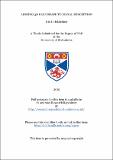Linking 3D face shape to social perception
Abstract
Advances in computer graphic and statistical methods have made it possible to visualise global face shape correlates of social judgments. The current thesis used a data-driven approach to investigate face shape correlates and perception of two traits, masculinity and strength, both of which are important in mate choice and social perception more generally. The studies presented defined the influences of body physique (height, body mass index, body fat and muscle mass) on facial shape, and their effects on the perception of masculinity, attractiveness and strength. Study 1 investigated the face shape correlates of actual and perceived masculinity. I found that perceived masculinity is not only driven by sexually dimorphic shape, but also by cues to body height and weight. Men with taller and heavier bodies were perceived to have more masculine-looking faces.
Study 2 investigated women’s perception of male attractiveness as a function of masculine face shape. As previously assumed but not explicitly tested, I found that masculinity preferences followed a quadratic relationship: attractiveness increased with increasing masculinity levels, but dropped o. at higher levels of masculinity. In addition, I showed that the relative costs and benefits of high and low masculinity are affected by individual differences in own condition, perceived financial harshness and pathogen disgust.
In Study 3, I found that perception of strength from faces is driven by facial cues to body physique; individuals with higher body bulk were perceived to be stronger. In men, it proved possible to further dissociate facial cues to muscle and fat mass which both contributed to strength perception. The thesis demonstrates that facial cues used in the evaluation of masculinity and strength are linked to bodily characteristics associated with sex differences and actual strength, namely height, weight, muscularity and adiposity. My findings therefore support the hypothesis that perceptions have an adaptive origin.
Type
Thesis, PhD Doctor of Philosophy
Rights
Embargo Date: 2018-01-08
Embargo Reason: Thesis restricted in accordance with University regulations. Print and electronic copy restricted until 8th January 2018
Collections
Items in the St Andrews Research Repository are protected by copyright, with all rights reserved, unless otherwise indicated.

